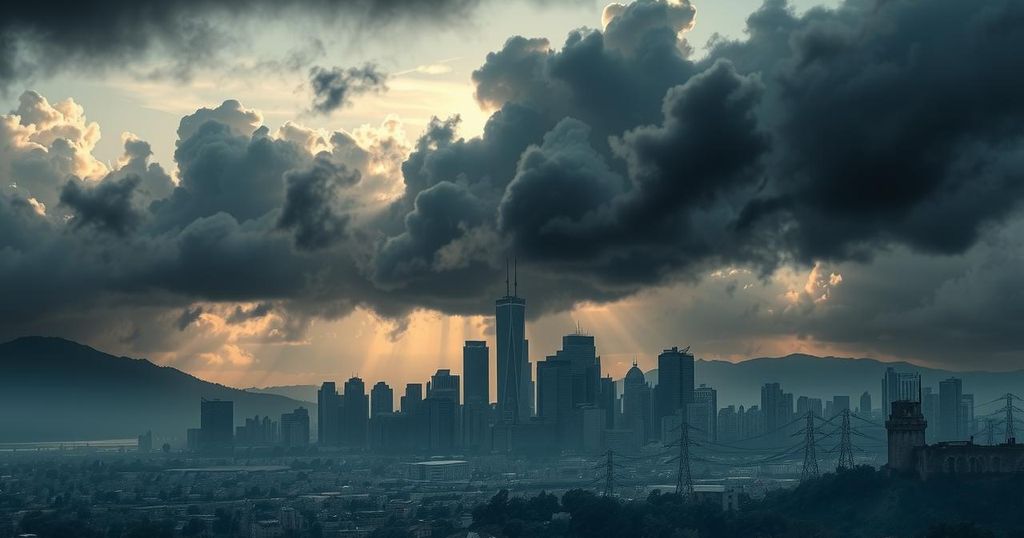Rwanda-backed M23 rebels have seized Goma, triggering mass panic among its residents and leading to significant military concerns for the Congolese government. The unrest stems from longstanding tensions amidst the country’s multiple armed factions and historical conflicts following the Rwandan genocide. The UN and various nations are responding to address the humanitarian impact and political implications of this capture.
Rwanda-backed rebels declared on Monday that they have captured Goma, the largest city in eastern Democratic Republic of Congo (DRC), creating mass panic among its 2 million residents, as reported by the United Nations. This takeover followed a deadline imposed by the M23 rebels, which demanded the Congolese army surrender their arms. In response, the Congolese government described the advance as a “declaration of war.”
The advance of M23 and approximately 3,000 to 4,000 Rwandan soldiers towards Goma signifies an escalation in one of Africa’s longest-running conflicts, threatening further civilian displacement. The Congolese military appears overwhelmed, with reports indicating that some troops have surrendered their weapons to UN peacekeepers amidst the turmoil. On Monday morning, residents heard heavy explosions and gunfire across central Goma, while a mass breakout from a torched prison reportedly resulted in fatalities.
Corneille Nangaa, a leader of the M23 alliance, announced that his forces had achieved control over Goma, resulting in Congolese soldiers surrendering. Government spokesman Patrick Muyaya released a video urging the protection of civilians, asserting that the situation in Congo had devolved into a wartime environment, subject to rapid changes.
The United Nations Security Council convened on Sunday, during which the United States, France, and Britain condemned Rwanda’s support for the rebels. Nevertheless, Rwanda countered, accusing the Congolese administration of hampering negotiations while supporting Hutu militias tied to the 1994 genocide, claims that Kinshasa has strongly denied. In light of the escalating violence, UN personnel and their families were evacuated to Rwanda, while international citizens were urged to leave Goma.
The eastern borderlands of the DRC have descended into chaos due to long-standing tensions among numerous militia factions, rooted in historical conflicts that followed the 1994 Rwandan genocide. M23, the latest iteration of Tutsi-led insurgents backed by Rwanda, had previously dominated Goma in 2012, but withdrew following international diplomatic pressure. Currently, the DRC houses over 100 armed groups, with significant mineral deposits of interest to global corporations.
The M23’s re-emergence was marked by a renewed offensive that began last year, seizing extensive territories in North Kivu, which includes key resources necessary for technology. The group presents itself as a protector of the Tutsi minority, while the UN has indicated substantial Rwandan military support bolstering M23’s capabilities. The ongoing conflict has worsened the humanitarian situation, with millions displaced across eastern Congo.
The ongoing conflict in the Democratic Republic of Congo has roots in the aftermath of Rwanda’s catastrophic genocide in 1994. The eastern DRC, particularly regions like North Kivu, has been plagued by various armed groups, with the M23 representing one of the most notable rebel factions. Historically, the M23 has received backing from Rwanda, leading to escalated tensions and military confrontations with the Congolese government. Goma, as a significant urban center in eastern DRC, serves as a focal point for these conflicts, highlighting the complexities of regional politics, humanitarian crises, and resource exploitation.
The capture of Goma by Rwanda-backed M23 rebels represents a significant escalation in the conflict within the DRC, causing widespread panic and potential further civilian displacement. As international powers address the situation, calls for civilian protection and sanctions against mineral exports from Rwanda emerge. The complexities of this situation demand close monitoring given the region’s history of violence, militia activities, and socio-political ramifications.
Original Source: www.ndtv.com






